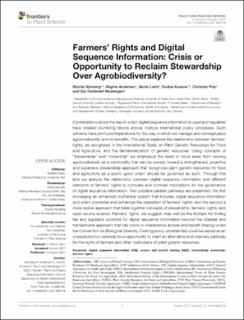| dc.contributor.author | Wynberg, Rachel | |
| dc.contributor.author | Andersen, Regine | |
| dc.contributor.author | Laird, Sarah | |
| dc.contributor.author | Kusena, Kudzai | |
| dc.contributor.author | Prip, Christian | |
| dc.contributor.author | Westengen, Ola | |
| dc.date.accessioned | 2022-07-20T07:19:17Z | |
| dc.date.available | 2022-07-20T07:19:17Z | |
| dc.date.created | 2021-08-13T12:44:18Z | |
| dc.date.issued | 2021 | |
| dc.identifier.citation | Frontiers in Plant Science. 2021, 12 . | |
| dc.identifier.issn | 1664-462X | |
| dc.identifier.uri | https://hdl.handle.net/11250/3007126 | |
| dc.description.abstract | Contestations about the way in which digital sequence information is used and regulated have created stumbling blocks across multiple international policy processes. Such schisms have profound implications for the way in which we manage and conceptualize agrobiodiversity and its benefits. This paper explores the relationship between farmers’ rights, as recognized in the International Treaty on Plant Genetic Resources for Food and Agriculture, and the dematerialization of genetic resources. Using concepts of “stewardship” and “ownership” we emphasize the need to move away from viewing agrobiodiversity as a commodity that can be owned, toward a strengthened, proactive and expansive stewardship approach that recognizes plant genetic resources for food and agriculture as a public good which should be governed as such. Through this lens we analyze the relationship between digital sequence information and different elements of farmers’ rights to compare and contrast implications for the governance of digital sequence information. Two possible parallel pathways are presented, the first envisaging an enhanced multilateral system that includes digital sequence information and which promotes and enhances the realization of farmers’ rights; and the second a more radical approach that folds together concepts of stewardship, farmers’ rights, and open source science. Farmers’ rights, we suggest, may well be the linchpin for finding fair and equitable solutions for digital sequence information beyond the bilateral and transactional approach that has come to characterize access and benefit sharing under the Convention on Biological Diversity. Existing policy uncertainties could be seized as an unexpected but serendipitous opportunity to chart an alternative and visionary pathway for the rights of farmers and other custodians of plant genetic resources. | |
| dc.language.iso | eng | |
| dc.relation.uri | https://www.frontiersin.org/articles/10.3389/fpls.2021.686728/full?&utm_source=Email_to_authors_&utm_medium=Email&utm_content=T1_11.5e1_author&utm_campaign=Email_publication&field=&journalName=Frontie | |
| dc.title | Farmers’ Rights and Digital Sequence Information: Crisis or Opportunity to Reclaim Stewardship Over Agrobiodiversity? | |
| dc.title.alternative | Farmers’ Rights and Digital Sequence Information: Crisis or Opportunity to Reclaim Stewardship Over Agrobiodiversity? | |
| dc.type | Peer reviewed | |
| dc.type | Journal article | |
| dc.description.version | publishedVersion | |
| dc.subject.nsi | VDP::Statsvitenskap og organisasjonsteori: 240 | |
| dc.subject.nsi | VDP::Political science and organisational theory: 240 | |
| dc.source.pagenumber | 16 | |
| dc.source.volume | 12 | |
| dc.source.journal | Frontiers in Plant Science | |
| dc.identifier.doi | 10.3389/fpls.2021.686728 | |
| dc.identifier.cristin | 1925803 | |
| dc.relation.project | Norges forskningsråd: 302631 | |
| cristin.ispublished | true | |
| cristin.fulltext | original | |
| cristin.qualitycode | 2 | |
